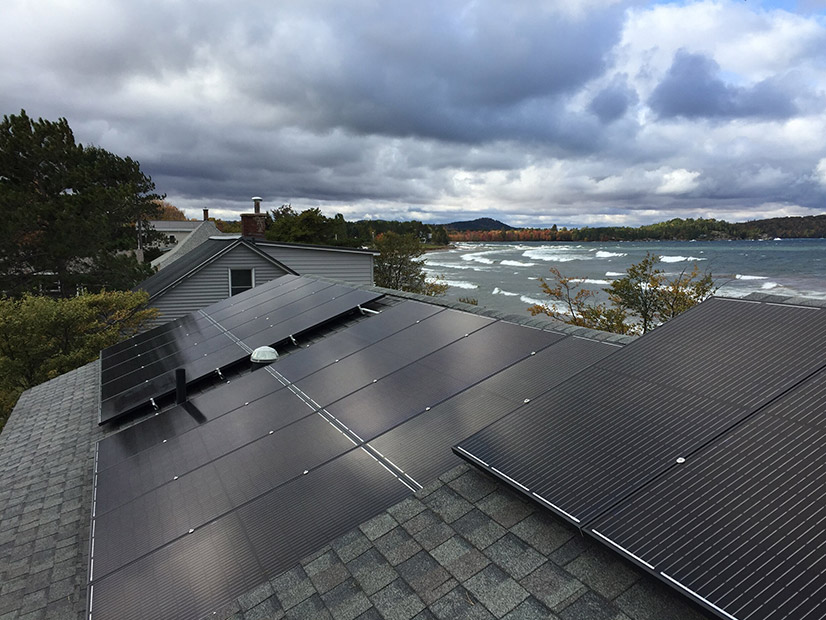LANSING, Mich. — Michigan’s two largest utilities said last week they support a “significant” increase in Michigan’s cap on rooftop solar, attempting to head off a bill that would eliminate the limit.
But during a press conference Tuesday, executives with CMS Energy and DTE Energy would not say what limit they would support. “How I would characterize it is a significant cap raise to allow long-term certainty,” said Brandon Hofmeister, senior vice president for governmental, regulatory and public affairs at CMS’ Consumers Energy.
The utilities called the press conference in response to HB 4236, which would open the state’s distributed energy generation program — created by Public Act 342 in 2016 to replace the previous net metering program — to all customers who meet interconnection requirements.
Under net metering, participants received the full retail rate for power they produced and injected to the grid. Under the distributed generation (DG) program, participants receive a rate determined by the utility or alternative energy supplier (AES), which is generally closer to wholesale prices. PA 342 capped each distributed generation program at 1% of the supplier’s average in-state peak load for the previous five years.
The bill, sponsored by Rep. Greg Markkanen (R), vice chair of the Michigan House Energy Committee, will be the subject of a hearing before the committee on Wednesday.
‘Compromise’ Sought
Hofmeister and Camilo Serna, DTE vice president of regulatory affairs, said they did not have specific language for a bill substitute but wanted to meet with stakeholders and policymakers on the issue. In a joint press release, the companies called for “a legislative compromise” to ensure the best prices for consumers, saying utility-scale renewables are more cost-effective than rooftop solar.
Rooftop solar “should be part of the solution only when done in a cost-effective way for all consumers,” they said, contending Markkanen’s bill “would extend what is effectively a tax on most utility customers to fund subsidies for a tiny number of ‘private solar’ users who can afford expensive rooftop installations.”
Under the current program, Serna said, energy that home solar programs export to the grid cost the utilities three times market prices. “Private solar customers use the grid far more than our usual customers,” which drives up utility costs for those other customers, Serna said.
‘Pure Gaslighting’
An official with one of Michigan’s leading environmental organizations accused the state’s two largest utilities of “pure gaslighting” in their announcement. “The reality is that our monopoly utilities don’t like rooftop solar because, even though they are guaranteed a profit, they lose money due to decreases in load,” tweeted Charlotte Jameson, legislative affairs director for the Michigan Environmental Council.
Jameson also said residential customer costs have increased in the last decade because of legislative and regulatory changes that allowed utilities to shift costs from industrial customers.
Markkanen blamed the utilities for “holding back an industry ready to take off in Michigan.” Markkanen said residents in his Upper Peninsula district are showing growing interest in solar systems for their homes and hunting camps, adding that he has a system at his camp.
An aide to Markkanen said he needed more time to review what the utilities are proposing before he could respond.
Rep. Joe Bellino (R), chair of the House Energy Committee, could not be reached for comment.
Jackson-based CMS Energy hit the 1% cap in 2020 but raised it to 2% with the PSC’s approval. Serna said it would be several years before DTE reached the 1% cap, which gives officials and interest groups time to develop a new compromise.
The Upper Peninsula Power Company hit the 1% cap in 2016, as many customers in the lightly populated region use their own wind generation or solar power to generate electricity.
Not Just for Wealthy
Jameson called the utilities’ suggestion that rooftop solar is available only to the wealthy inaccurate, citing data from Lawrence Berkeley National Laboratory that found 63% of Michigan solar adopters in 2019 had household incomes below $100,000.
She also said rooftop customers are paying their fair share of utility costs. “In 2017 the [Michigan Public Service Commission] undertook a study and sought stakeholder input to craft a DG tariff that fairly charges rooftop solar customers. The commission has testified multiple times to the legislature that there is no subsidy for rooftop solar customers under the current DG tariff.”
Nick Occhipinti of the Michigan League for Conservation Voters called the utilities’ position “arbitrary,” saying they were blocking “growth of a terrific industry.”
The Public Service Commission has not taken a formal stand on Markkanen’s bill. But during the bill’s a previous committee hearing, PSC Chair Dan Scripps said the commission supported, “in concept, lifting the DG program cap.”
Scripps added that solar developers “provide good paying jobs to our residents, and we would really hate to see them forced out of business through no fault of their own.”





